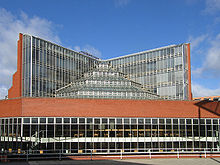 The faculty building on the Sidgwick Site | |
| Type | History |
|---|---|
Parent institution | University of Cambridge |
| Location | , , |
| Website | www |
The Faculty of History is one of the constituent departments of the University of Cambridge.
Contents
Teaching and research of history has centuries old roots at Cambridge and the first Regius Professorship of Modern History was established by King George I in 1724. The History Faculty is one of the largest history departments in the world with well over a hundred faculty members. Each academic year a new intake more than two hundred undergraduates is admitted and the Faculty also has more than 450 graduate students studying for masters degrees and the PhD. It is notable among Cambridge's faculties for the influence of its alumni in public life.
The Faculty is divided into eight subject groups (i.e. areas of research and teaching): American History; Ancient and Medieval History; Early Modern History; Economic, Social and Cultural History; Modern British History; Modern European History; Political Thought And Intellectual History; and World History. [1]

